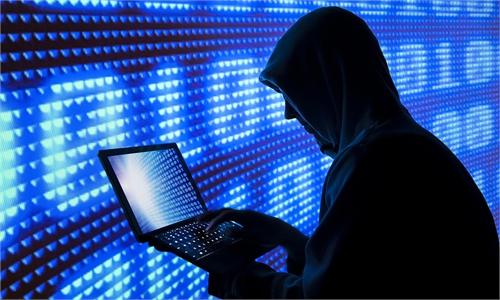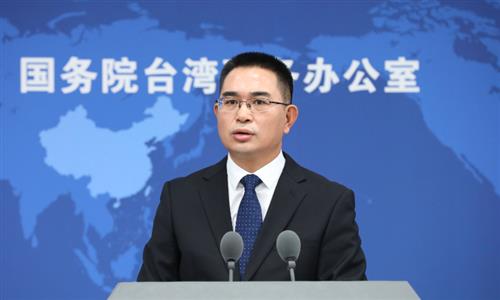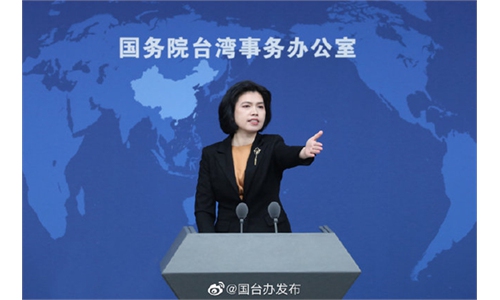Taiwan regional leader Lai’s ‘Double Ten’ speech ‘a poison pill wrapped in cellophane’
Not a ‘soft’ signal but a further advancing of separatist agenda: scholars

DPP candidate Lai Ching-te. Photo: VCG
Taiwan regional leader Lai Ching-te's "Double Ten" speech is like "a poison pill wrapped in cellophane" and despite his repeated use of the word "peace," his propagation of the separatist "Taiwan independence" agenda remains unchanged, said analysts who noted that any actions toward secession will inevitably face decisive countermeasures.On Sunday, the Center for Cross-Straits Relations Studies at the Renmin University of China held a seminar on changes in the political situation in Taiwan island and the direction of cross-Straits relations, during which scholars analyzed the evolution of Lai's separatist rhetoric since he assumed the role of Taiwan region's leader on May 20, leading up to his "Double Ten" speech. They said that despite the deceptive nature of his remarks, it is evident that Lai is not merely talking about "Taiwan independence" — he is actively taking steps to promote it.
Since Lai's speech on October 10, in which he claimed that the People's Republic of China has no right to represent Taiwan and that they are "not subordinate to each other," there has been widespread controversy and criticism from both the mainland people and people on the island. However, some Western media referred to Lai's "Double Ten" speech as "softer" than his recent speeches.
Wang Yingjin, director of the Center for Cross-Straits Relations Studies, said at the seminar on Sunday that Lai's "Double Ten" speech appeared to have introduced two changes: a noticeable reduction in provocative language and a shift in his stance toward the "Republic of China" (ROC) - moving from previously rejecting the "ROC" to now embracing and utilizing it.
The "ROC" Lai refers to, however, is one that has taken root specifically in the regions of Taiwan, Penghu, Kinmen, and Matsu - a "Taiwanized ROC." This is fundamentally distinct from the ROC advocated by the Kuomintang, which encompasses the mainland, said Wang, noting that these changes are merely tactical adjustments.
Lai's speech is highly deceptive and misleading, causing many in the international community to mistakenly perceive it as a "softening signal" toward the Chinese mainland, said Wang.
The core and essence of the cross-Straits portion of the "Double Ten" speech remained unchanged in six key aspects: the essence of promoting "Taiwan independence" has not changed; the confrontational stance toward the mainland has not changed; the narrative of playing the "democracy and freedom" card has not changed; the methods of colluding with external forces have not changed; the tactic of blaming the mainland for the deterioration of cross-Straits relations has not changed; and the hyping of the "China threat" rhetoric has not changed, Wang said.
"This all demonstrates that Lai is determined to recklessly advance along the path of 'Taiwan independence,' posing a serious threat to peace and stability in the Taiwan Straits. He is undoubtedly a 'pragmatic instigator of war,'" Wang told the Global Times.
Some scholars at the seminar described Lai's "Double Ten" speech, along with his recent separatist remarks that propagate a "two-state" rhetoric as "a poison pill wrapped in cellophane" or a "Taiwan independence stance under a new disguise." They emphasized that this cannot be seen as a so-called soft signal to the mainland but rather as a further move to sever cross-Strait relations that may led to more confrontations.
Lai's speech embodies the essence of "Taiwan separatism," laden with cunning and deceit. While some Western media depicted it as "soft," this supposed moderation is a mere façade. By emphasizing mutual non-subordination, Lai is attempting to legitimize "Taiwan separatism," said Zhu Guilan, an expert from the Institute of Taiwan Studies under Tsinghua University.
The current struggle against "Taiwan separatism" is not a matter of systems or ideologies, but a fight between reunification and separation, said Zhu Guilan, noting that "our fight is fundamentally about defending China's national sovereignty, which has never wavered over Taiwan island."
Lai and the Democratic Progressive Party's push for "Taiwan separatism" is entirely unjust, illegitimate and unlawful under both Chinese and international law, as well as among sovereign nations. His pushing of separatism, his efforts to seek foreign support - particularly from the US - and even his advocacy for military means to secure "Taiwan separatism" should face decisive countermeasures, Zhu Guilan said.
Although Lai frequently mentioned "peace" in his speech, his concept of peace is riddled with contradictions and hypocrisy. While he often invoked the term, his policies and rhetoric mask the true intent of fostering division and confrontation across the Taiwan Straits. His use of "peace" is insincere, serving instead as a tool to escalate tensions, Zhu Songling, a professor at the Institute of Taiwan Studies of Beijing Union University, told the Global Times on the sidelines of the Sunday seminar.
Zhu Songling noted that Lai and the separatists' actions in the island of Taiwan will inevitably challenge regional security and heighten the risk of war. Their "Taiwan independence" agenda will fail to protect Taiwan's security, putting its 23 million people in a precarious situation.
While the mainland is committed to peaceful reunification, it has made clear that any form of "Taiwan independence" will not be tolerated, said Zhu Songling, noting that timely warnings to Lai and his group are essential.




